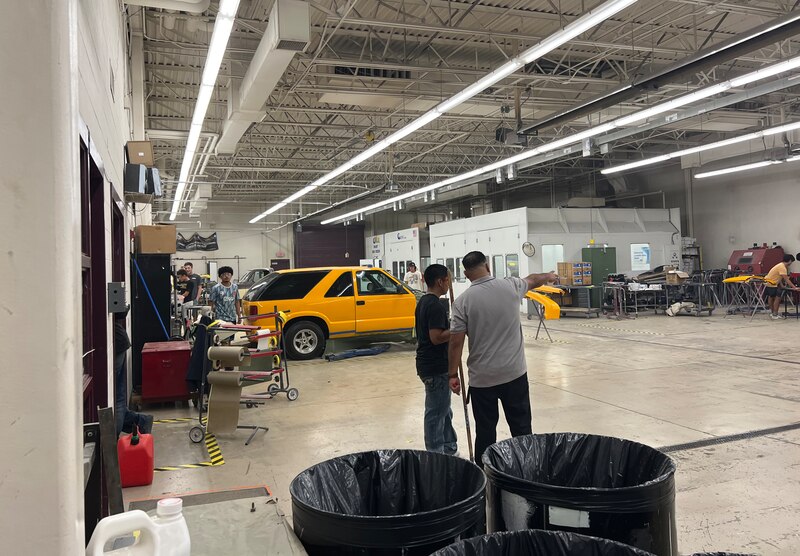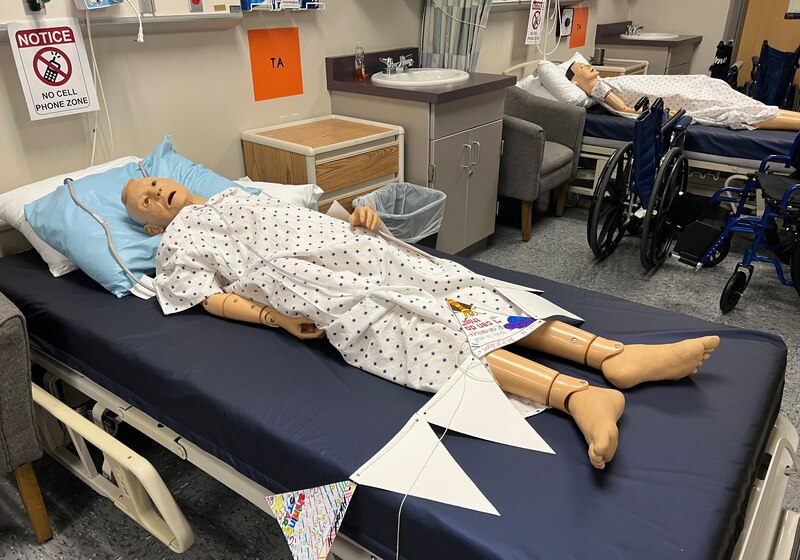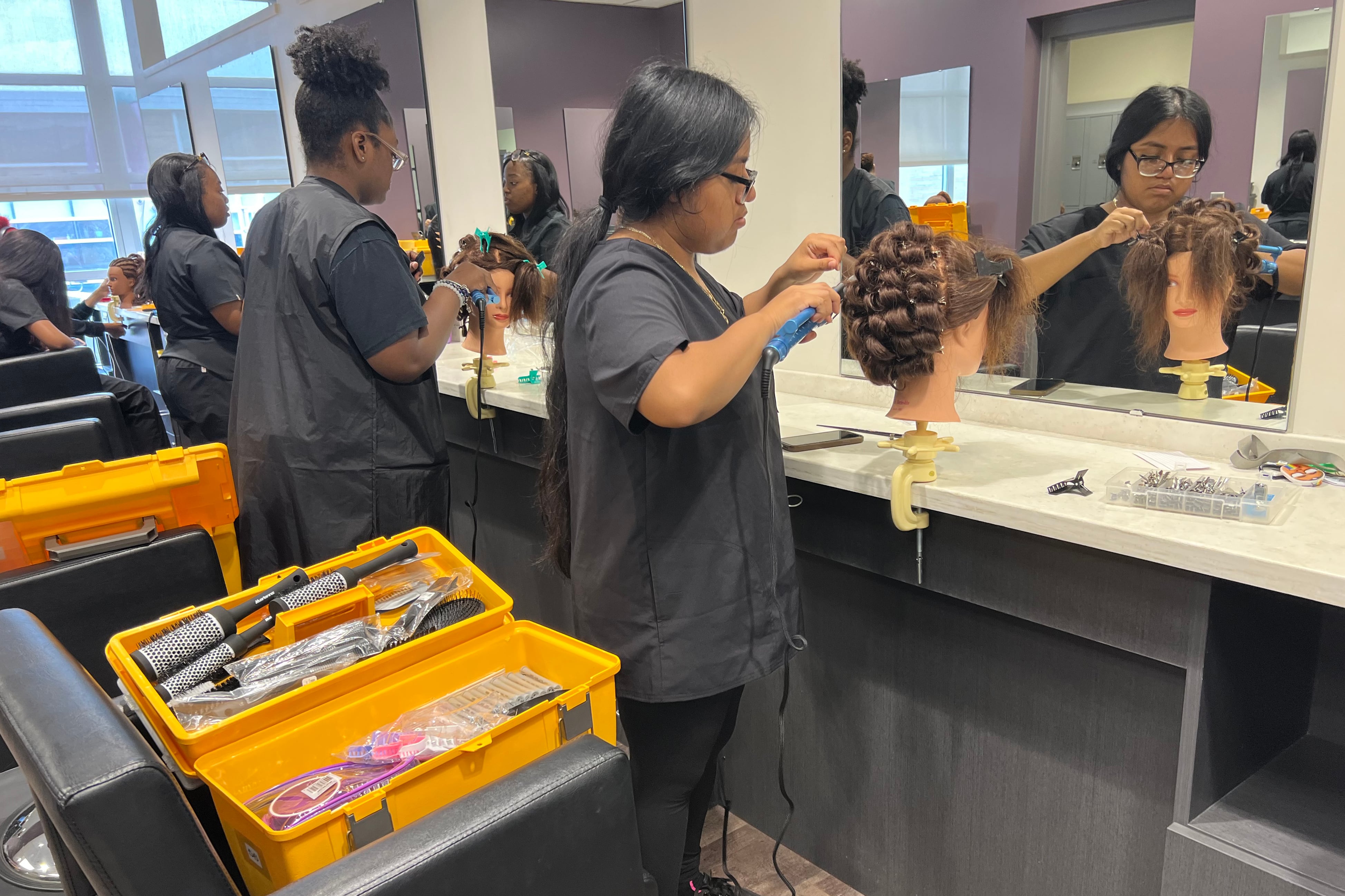The halls of Area 31 Career Center in Ben Davis High School in Indianapolis are quiet. It’s a Friday afternoon in the second week of school, and behind each door, a new career path awaits.
Patrick Biggerstaff, director of career and technical education, opens the door to the automotive collision repair course and the empty hallway is suddenly engulfed in sound. Tools line the walls and cars of all makes and models fill the space. Students wearing safety goggles hose and mop the floor.
Behind another door is an ambulance fully equipped with lights, a stretcher, and several training mannequins. Yet another door hides a salon where students are perfecting a type of pin curl. Instead of pencil cases and notebooks, yellow boxes full of brushes and clips are located at each workstation.
Other rooms host a multitude of professional possibilities with kitchens packed with huge mixers and restaurant-size bottles of seasoning, mock medical stations furnished with hospital beds and wheelchairs, and computer labs housing cybersecurity students engrossed in an activity about hacking.

Area 31, which serves 11 high schools, including Ben Davis, allows students to work towards certification or obtain college credit. The center provides opportunity in a state where the college-going rate has hardly changed since last year’s report on the class of 2020 showed around 53% went to college.
While Area 31 Career Center is not new, Biggerstaff, who started at Ben Davis as a teacher 17 years ago, says he recognizes changes. In the past, Biggerstaff says, Area 31 programs were seen as last resorts for students who were behind academically, but over the past decade, students now have a wide range of strengths.
Biggerstaff says Area 31 is working hard to make sure students can achieve certification or college credit.
Tola Aluko, who’s in the pharmacy tech program, first heard about Area 31 when she was in eighth grade. She was interested in the Early College Career Center with Vincennes University, which allows students to complete associate degrees in select programs, like pharmacy tech. Now a senior, she says she hopes to study forensics and pharmacology in college.
Aluko says she feels like she’ll have an advantage in college because the program helped her learn about medication and lab practices.
Biggerstaff says the state routinely emphasizes the three routes students can take after high school: employment, enlistment, or enrollment. But in his opinion, it’s not fair to push a student down one path without giving them the opportunity to explore the others.
“I had two high school principals tell me I’d never graduate high school,” Biggerstaff says. “You can’t look at a kid and know for sure where they’re going to be. We’ve got to prepare them for all three of those routes, and then let them make the decision. And guess what? It’s probably going to change.”
Applying for Area 31
At the beginning of a new school year, most Indiana students are in classes for eight hours. For students at Area 31, that rhythm looks a little different.
Students attend three-hour career center classes in the afternoon or morning. For the rest of the day, students attend their normal high school classes. Some career center classes remain on campus, while others might be held at places like construction sites and medical facilities for students to gain practical experience.

Students, typically juniors and seniors, can apply in January and rank programs they’re interested in; their counselors then determine if they have time for a three-hour class. An enrollment committee makes final decisions based on GPA, attendance, and behavior.
Class size varies depending on the program. For example, a construction trades class can have up to 40 students because the bus to a construction site can seat that many students, Biggerstaff says.
Welding is Area 31’s most in-demand program with 75 students on the waitlist, Biggerstaff explains.
Forrest Lee, a senior at Cascade High School, says he was inspired to look into the career center because of his brother, who’s a welder. While Lee didn’t want to do welding, he wanted to do something similar, so he chose construction trades.
“I like seeing the progress you’ve made with a building especially,” Lee says. “Just seeing at the end of the day what you’ve done, I think that’s really awesome.”
Preparing students for real-life situations
The center has many instructors who have work experience in the fields they teach. Lauren Freeman, an instructor in her second year of the pre-nursing program, is a registered nurse and previously worked at Ascension St. Vincent Hospital.
Even though students have just entered the program, they’re already learning about professionalism and skills employers are looking for, Freeman says.
Some students have already started applying those skills in professional environments. Seniors Ashley Neese and Paige Allen-Price are in the horticulture program, and worked together at Dammann’s Garden Center and Greenhouse. Neese still works there and says it’s made her job that much easier.
“I’m able to identify species better or I can answer questions about chemicals,” Neese says. “Now I can tell which is full sun and what’s not full sun, what’s gonna come around every year, what’s not gonna come around. I have a lot more respect at my job than I used to.”
Neese lists the positives of being part of Area 31: she feels more responsible and has developed a broader worldview. “And you make friends!” Neese says, gesturing towards Allen-Price. “So many friends.”
Biggerstaff says he wants students to choose whichever career path is right for them. On the way into Biggerstaff’s office is a sign on the wall that reads in simple black lettering, “work hard and be nice to people.”
“So many families in our country look at that four-year college degree attainment as that status symbol,” Biggerstaff says. “Like I as a parent have failed, if my kid doesn’t go to a four-year college. But the reality of our environment is that there are many, many paths to success.”
Jade Thomas is a summer reporting intern covering education in the Indianapolis area. Contact Jade at jthomas@chalkbeat.org.






